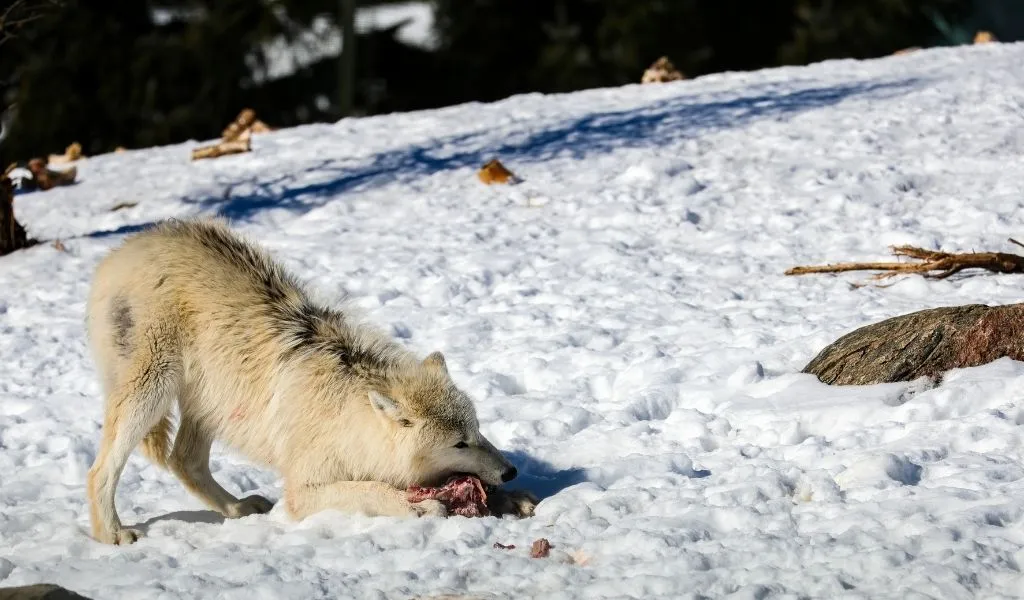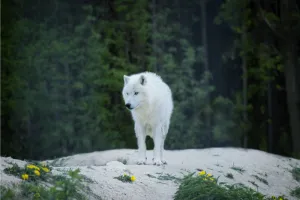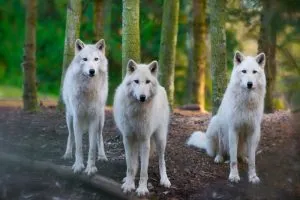Most wolves are meat-eaters, but occasionally take plant material such as leaves and berries. But what does an Arctic wolf (canis lupus arctos) eat, and does their diet make them carnivores?
Arctic wolves are carnivores because they are primarily meat-eaters that consume fish, invertebrates, and mammals such as lemmings, caribou, arctic hare, and muskox. However, they have been known to eat plant material such as nuts and leaves, so they are not restricted to a purely carnivorous diet.
Keep reading to find out more about the harsh realities faced by the Arctic wolf, including competition and climate change, as it struggles to find enough food to survive.
Are Arctic Wolves Omnivores or Carnivores?
Arctic wolves are considered to be carnivores because their diet mainly consists of meat. They belong to the order Carnivora, a large group named after the tendency of its members to eat meat.
Carnivorans tend to have large brains, hunting behaviors, and specialized digestive systems, teeth, and jaws1 (source: Australian Museum), traits that the arctic wolf has.
They have been known to eat some plants which is why some people may refer to them as hypercarnivores, which are animals whose diet consists of more than 70% meat. Although within their range, plant matter is only available in the warmer months.
What Do Arctic Wolves Eat?
Arctic wolves primarily eat meat including fish, invertebrates, and mammals such as lemmings, caribou, arctic hare, and muskox2 (source: Canadian Journal of Zoology, F.Dalerum, et al, Vol 96, No. 3, 2018). They hunt and kill most of their food, but will also scavenge on carcasses left by polar bears and other predators.
The Arctic wolf has the large brain, high intelligence, and hunting instincts of a carnivoran. Its teeth and digestive system are highly-adapted to attack, kill, crunch, and digest all the parts of an animal, including bones.
During the summer months, arctic wolves may eat some berries or chew on roots.
Arctic wolves are a subspecies (type) of gray wolf. Gray wolf and arctic wolf diets and feeding behaviors are similar. However, arctic wolves live so far north that food type and availability is different from what gray wolves have available.
How Much Do Arctic Wolves Eat?
All wolves feed sporadically, taking what they can whenever they can. They can eat up to 20 pounds of meat in one sitting, but may then go days without eating anything3 (source: International Wolf Center).
Arctic wolves live where large prey is scarce, and they require more energy to keep warm. Between large meals, they snack on whatever rodents and invertebrates they can find.
How Do Arctic Wolves Hunt?
Arctic wolves employ a variety of strategies to hunt. A single wolf may pursue small prey on its own, using its keen sense of smell to find rodents. Two wolves may work together to hunt faster small prey such as arctic hares, with one wolf chasing the hare towards the other wolf4 (source: Arctic, L. D. Mech, Vol. 60, No. 2, 2007).
To catch larger prey such as caribou or muskoxen, arctic wolves hunt in packs or family units where they cooperate to bring the prey down.
Each arctic wolf pack occupies a territory. Territories vary in size according to food availability. During the day, individual wolves keep an eye out for prey moving within their territory.
Arctic wolves use teamwork and tactics to stalk their prey and ambush it. As the prey animals run into the open, the wolves select one animal to pursue. The pack works together to flank the animal and run it down, sometimes at a distance over several miles.
Arctic wolves tend to single out the weakest animal in a herd of caribou or muskoxen. Therefore, wolf hunts are an example of natural selection at work. The wolves kill sickly or slow prey animals, leaving the strongest to survive and reproduce.
Wolf hunting strategies can show surprising foresight, understanding, and planning 5 (source: Arctic, L. D. Mech, Vol. 60, No. 2, 2007). Hunting large animals is dangerous but provides enough food for the whole pack. Wolves have to use their intelligence to make their hunting trip worthwhile.
Threats to Arctic Wolves Prey
Arctic wolves face competition from Arctic foxes for their smaller meals. However, Arctic wolves kill foxes on occasion. Polar bears are a worthier foe, competing with the wolves for carrion.
The main threat to Arctic wolf populations is from climate change. Extreme weather events linked with climate change have affected populations of Arctic hares and muskoxen. The lack of feeding opportunities has prevented some Arctic wolf packs from breeding6 (source: Climatic Change, L. D. Mech, Vol 67, 2004).
Climate change affects polar regions more intensively than regions closer to the equator7 (source: Diversity and Distributions, Floris M. van Beest, et al, Vol 27, Issue 9, 2021). Species such as the Arctic wolf are more at risk from climate change than species with a more southern range.
Related Questions
Do Arctic Wolves Eat Snowy Owls?
Yes, arctic wolves are one of the few predators of snowy owls8 (source: The Peregrine Fund).
Do Arctic Wolves Eat Penguins?
No, arctic wolves do not eat penguins because their ranges do not overlap. Penguins are found in the Southern Hemisphere whereas Arctic wolves are found in the Northern Hemisphere.
Do Arctic Wolves Eat Fish?
Yes, arctic wolves eat fish. They are a subspecies of gray wolves which are known to sometimes eat fish9 (source: Canadian Journal of Zoology, C T Darimont, et al, Vol 81, No. 2, 2003).
Do Arctic Wolves Eat Polar Bears?
No, arctic wolves do not eat polar bears because they are too strong and fierce for a pack to take down. However, arctic wolves occasionally kill polar bear cubs.
Do Arctic Wolves Eat Plants?
Yes, Arctic wolves occasionally eat plants such as roots and berries if they find them.
Do Arctic Wolves Eat Humans?
No, arctic wolves do not typically eat humans. However, under exceptionally rare circumstances, arctic wolves will attack humans10 (source: Alaska Department of Fish and Game, Division of Wildlife Conservation, 2011).




